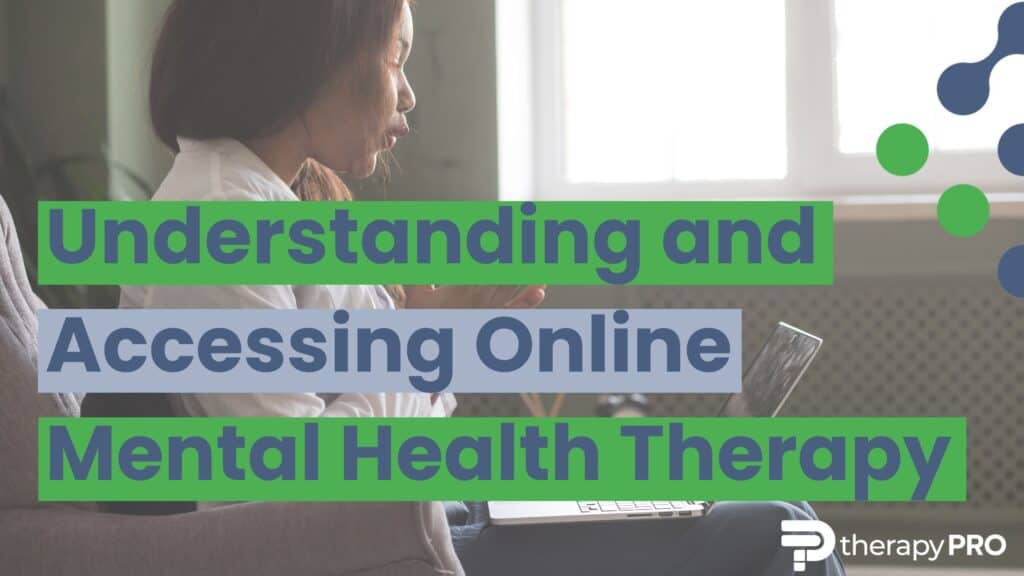Understanding and Accessing Online Mental Health Therapy Support in Australia
Mental health is an integral aspect of our overall wellbeing, influencing how we think, feel, and interact with the world around us. Despite its significance, it often takes a back seat, overshadowed by the hustle and bustle and routine of everyday life.
This article focuses on the importance of mental health, ways to access support in Australia, and how, with help from the right mental health professional, our lives can be profoundly and positively impacted when we prioritise our wellbeing.
Remember this: you don’t have to feel that your mental health has severely declined to access support services. It might be that you just don’t feel your usual self, or that you’re consistently feeling overwhelmed in situations where you usually feel in control. It might be that you’re going through a tough transition in your life, have experienced grief or loss, or your connections with your communities aren’t as strong as what they once were.
Mental health decline doesn’t discriminate, and it doesn’t need to feel dire before you take action. Support is available.
Let’s start by looking at four types of mental health and how they impact our overall wellbeing.
Four Types of Mental Health
#1 – Emotional Health
This relates to our ability to manage and express emotions effectively. Emotional health is fundamental in building resilience, fostering relationships, and maintaining a positive mindset.
For instance, if you’ve recently gone through a breakup, been made redundant, or suffered a personal loss, your emotional health may be under strain. Consider how you respond to these emotions—do you acknowledge and address your feelings, or do you bottle them up? If you are struggling to regulate your emotions, and it’s impacting how you live your life or interact with others, it may be time to seek support.
#2 – Psychological Health
This refers to our cognitive and intellectual capabilities. Good psychological health allows us to process information, make decisions, and maintain focus.
Challenges to psychological health can appear as difficulty in making decisions or remembering things, trouble concentrating, or feeling mentally exhausted after simple tasks. If you are feeling this way, engaging in targeted psychological strategies with the support of a therapist, may help to restore your mental clarity, which can have a ripple effect across other areas of your life.
#3 – Social Health
This revolves around our relationships and how we interact with others. Social health is about community, support networks, and our ability to empathise and connect.
Signs that your social health might be waning include feeling disconnected from others, struggling to maintain relationships, or feeling unsupported. A mental health professional can help you to navigate why you may be feeling disconnected and help you come up with a plan to improve your social health.
#4 – Spiritual Health
This pertains to our sense of purpose and the values that guide us. Spiritual health can encompass religious faith, personal development, or a passion for peace and social justice. If you’re feeling lost, or questioning the ‘bigger picture’, your spiritual health might need attention.
Understanding these four types of mental health can give us some clues to the state of our overall wellbeing and whether we need support to maintain a healthy balance.
If support is needed, the next step is working out the best pathway to care. And in Australia, there are several avenues for accessing mental health care.
Accessing Mental Health Care in Australia
Understanding how to access mental health care can feel overwhelming, especially if you’re new to therapy.
The journey often begins with a visit to your General Practitioner (GP) to discuss how you’re feeling, and which area of your mental health feels compromised, make sure you book an extended appointment.
Your GP will assess your situation to determine what help you need. This could be:
- Making a mental health assessment
- Creating a Mental Health Care Plan (MHCP)
- Referring you to a psychiatrist or other mental health professional
- Giving you a prescription for medicines to treat depression or anxiety.
A personalised MHCP, can help you to access Medicare rebates and reduce the cost of therapy. Your MHCP allows you to claim up to 10 sessions with a mental health professional in a calendar year.
Take your MHCP, along with a referral letter from your GP, to the mental health professional of your choice (mental health social worker or psychologist). If you’re unsure who to see, your GP will have suggestions for you.
If you don’t want to, or can’t see a GP soon enough, about your mental health, some mental health providers will accept a booking without a referral. Depending on your level of private health care cover, you may be able to claim a portion of the fee-for-service cost. It’s best to check the levels and types of extras you have included in your private health policy.
You can attend therapy in a clinic or, if travelling to therapy doesn’t work for you, you can also access support via online mental health services, which allow you to meet with a therapist either over a phone or video call.
The Benefits of Online Mental Health Therapy Sessions
Don’t be put off by accessing online mental health therapy services.
Meeting with a therapist virtually has become increasingly easier, more convenient, and is also highly accessible. Embracing technology in mental health care presents several benefits that cater to the diverse needs of individuals:
Accessibility: Online therapy breaks down geographical barriers, allowing individuals in remote or underserviced areas to access quality mental health support. Regardless of your location, support is a click away.
Convenience: Online sessions can be scheduled at a time that suits you, eliminating commute time and allowing therapy to fit seamlessly into your routine. Whether you prefer morning discussions or evening reflections, online therapy accommodates your preferences.
Comfort and safety: Engaging in therapy from the comfort of your home can provide a sense of security and ease. For those who may feel anxious about in-person sessions, online therapy offers a gentle introduction to mental health support.
Anonymity and privacy: Online therapy can sometimes feel less intimidating, allowing individuals to open up more easily. Strict confidentiality and privacy measures ensure that your sessions are secure, and your information is protected.
Consistency: Online therapy ensures that even in times of social distancing or personal constraints, your mental health care can continue uninterrupted. Regular sessions contribute to steady progress and consistent support.
Affordability: With the option of Medicare rebates through a MHCP, online therapy can be a cost-effective solution. Cutting down on travel costs and time, it ensures that support is financially accessible.
Variety of therapeutic approaches: Online platforms allow access to a diverse range of therapists, each with their unique approach and specialty. Whether you’re looking for psychological counselling or social work support, online therapy offers an array of options.
Embracing the digital shift in mental health care can ensure that no matter where you are, support is available.
You can speak to your GP about other benefits of accessing therapy via online services. They may outline this as an option in your MHCP. Let’s look at what else will be included.
What is Included in a Mental Health Care Plan?
A Mental Health Care Plan is a strategic approach to managing your mental health.
Your GP will help you to outline your goals for receiving mental health support as well as outline the support and treatments you may need to help you reach your goals.
A comprehensive MHCP should include:
Assessment: An honest discussion about your mental health, including any symptoms or concerns. It may also include any survey results that you have undertaken for your GP.
Goals: Outlining what you hope to achieve through therapy and support.
Strategies: Identifying the steps, treatments, or interventions needed.
Support services: Information about accessing professionals like social workers and psychologists, including both in-person and online options.
Review and timeframes: A plan to reassess and adjust the strategy as needed.
How Do Therapists Treat and Support Mental Health Conditions?
Treatment and support for mental health conditions can take many forms. Some common approaches include:
Therapy and counselling: Therapists offer professional advice and strategies to cope with mental health issues. Services include psychology and social work, both of which can play an integral role in mental wellbeing.
Medication: Depending on the condition, medications can be prescribed to manage symptoms. Medications are usually only prescribed by psychiatrists. Psychologists and mental health social workers cannot provide prescriptions.
Support groups: Sharing experiences with others can foster a sense of community and understanding.
Lifestyle changes: Incorporating exercise, a balanced diet, and mindfulness can complement treatment.
Your therapist may outline some intervention programs to further support you to reach your goals. These programs can range from workplace interventions to combat fatigue and burnout, to programs designed to support early childhood mental health.
It all depends on your unique needs and goals, however your therapist will work through this in detail with you, to ensure the plan in place is the right one for you.
Embark on your Journey Towards Better Mental Health Today
Recognising the importance of mental health is the first step towards fostering a fulfilling and balanced life. As an allied health organisation, we understand that reaching out can be daunting, but remember – support is available, and you are not alone.
Book an online mental health therapy session with us and take that initial step towards a brighter, healthier future. Your wellbeing is worth prioritising, and with the right support, positive change is absolutely possible.




